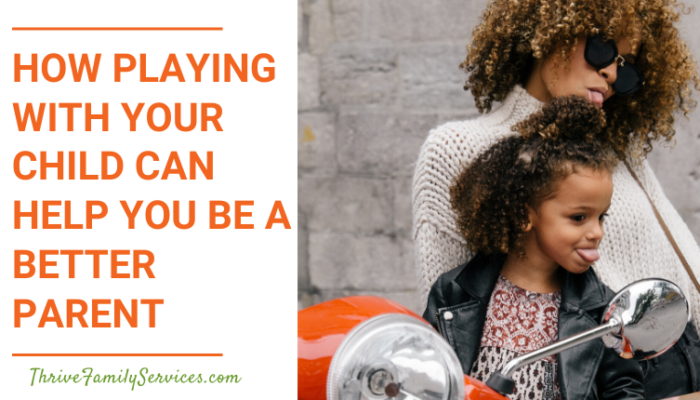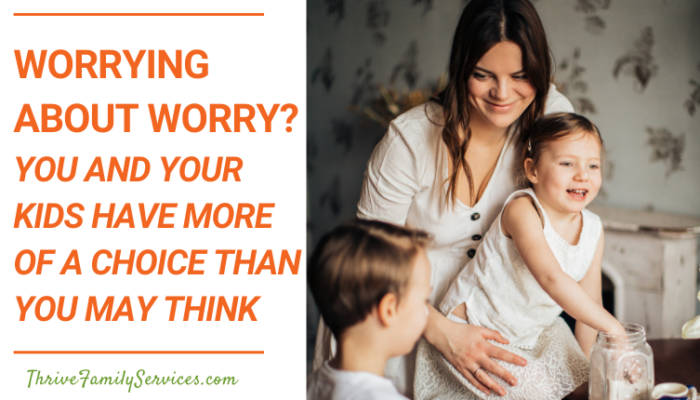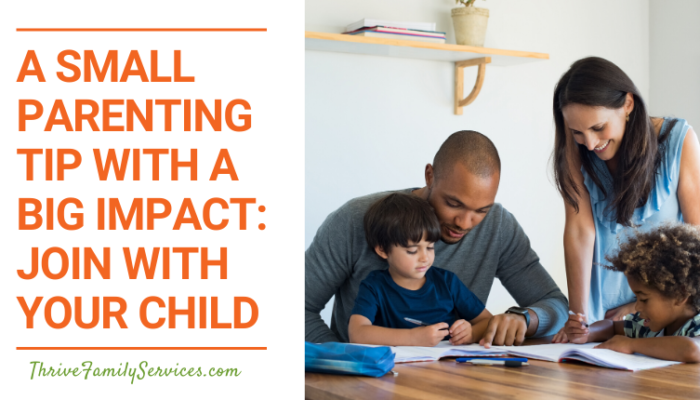Imagine someone asking you the question: “Can playing with your child make you a better parent?” I’m sure the majority of parents would say, “Yes.” One of the obvious reasons that most people would give is that playing with your child makes you a better parent because you are spending more time with your child. And this makes sense! It is a logical thought to think that the more time that a parent spends with their child, the better the relationship will be between them.
So although it is true that parents and children have better relationships by spending time together, there is a lot more to it than just that.
Did you know that before the age of 8, playing is the primary language that a child has? Playing also helps kids develop physical skills, cognitive concepts, language, and social skills.
In fact, playing is a critical way for kids to grow and develop in a healthy way!
For kids who are 7 and younger, therapy often includes elements of playing and toys as a way to help children make sense of their world, their relationships, and their emotions. Playing can actually help the child and the therapist understand each other better and develop a common language for what is happening in the child’s life.
The same thing can happen for kids and parents at home! In fact, playing with your child has been shown to reduce disruptive behavior, increase the child’s intelligence, improve their confidence, and reduce aggressiveness.
So how are parents supposed to know “the right way” to play with their child to see these improvements? And what toys work best for playing together?
Becoming part of your child’s playtime takes practice. It is very tempting for parents to use their child’s playtime as an opportunity to get “adult stuff” done. Too often, our kids want to play with us and we tell them, “Not now, I’m busy,” or “I’ll play with you this weekend,” but never get around to it. Still, there are some parents that want to play with their child, but they don’t know how! It feels too silly, or they aren’t sure how to play with blocks or stuffed animals anymore.
The good news is that children don’t need a lot from their parents for playtime to have positive effects on the relationship.
There are three easy things that parents can do to improve playtime with their child:
1. Track:
Showing your child that you are interested in what they are doing by verbally tracking their play may seem silly, but it is really important for language development and for your child feeling understood by you.
For younger kids (1-4 years old), tracking looks like saying things along the lines of, “You just put the green block on top of the orange block” or “You just put a hat on Daddy’s head!”
For older children (5-8 years old), tracking gets a little more advanced. It may sound like, “Oh wow, that pony lost the horse race! I wonder if he feels sad” or “You changed your mind and picked up a purple crayon instead of black.”
Saying tracking phrases helps kids connect the dots between objects and words, but it also helps them understand that you care about and watch what they do. It can spark conversation between the child and parent, or it helps the child get more creative in their play. Either way, it is a great tool for parents to use when playing with their kids!
2. Follow:
Following your child’s play simply means to just join in on what they’re doing. If your child is playing with their dollhouse, grab some dolls. If your child is playing with race cars, join in! It can be tempting to say something like, “let’s build legos instead,” if you don’t want to do what your child is doing. However, the ability for parents to just follow their child’s play is great for the parent-child relationship.
3. Praise:
Whenever you can, give praise to your child while playing. If they are jumping on the trampoline and finally nail that backflip, saying “Wow I am so impressed!” is better than saying, “Be careful out there.” Kids want to know that their parents see them and are proud of them. Even if your child is simply dressing a Barbie doll, saying “I love that outfit you put on that doll!” will go a long way for your relationship with your kid.
Of course, the way that parents would do these things would depend on their child’s age. Younger kids will need simpler tracking phrases and praises than older kids. The toys that parents and kids use while playing together will also vary by age. Of course, the older the child gets, the more intricate the toys can be.
Here are some guidelines for what toys work best for kids by age:
- 1-3 years old: Toys that involve movement are best for kids in this age range, like dress up, soft blocks, coloring books, stuffed animals, and tricycles
- 4-5 years old: Toys that involve socializing with others are best for preschool-aged children, like puppets, board games, puzzles, playing house, and storybooks
- 6 to 8 years old: Toys that involve some level of skill or knowledge are best for kids in this age range, like arts and crafts, sports equipment, memory games, legos, or board games
It is important to note that toys like video games or apps do not work as well as tangible toys and activities for improving behavior and relationships. Try to avoid resorting to this type of play when possible, or limit it to specific days/times.
There is actually a type of therapy called “Parent-Child Interaction Therapy” or PCIT that is aimed at helping parents and caregivers improve their relationship – and family dynamics as a whole – by playing with their child in session. PCIT offers more in-depth skills that parents can do with their child to see a positive improvement in their relationship and behavior. If this is something that interests you, feel free to schedule an appointment with one of our Greenwood Village Counselors.




